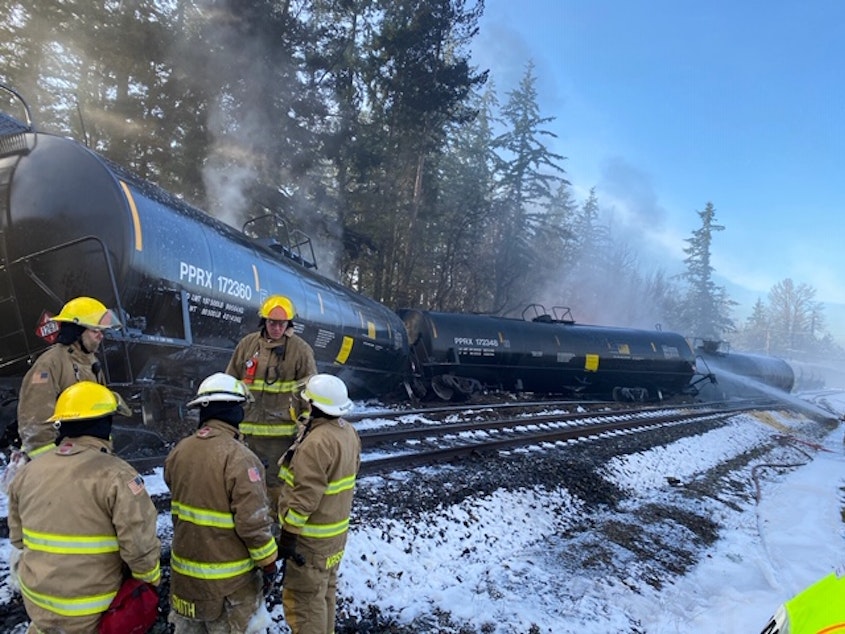Is carrying crude oil by rail worth the risk? This expert says no

In the Northwest region, there are nine freight derailments per month, on average.
In Whatcom County on Tuesday, a mile-long oil train derailed and caught fire as it was rolling toward a refinery in Ferndale. No one was hurt, and state officials say there have been no wildlife impacts.
Eric de Place is an expert on oil trains and derailments. He's director of energy policy at the Sightline Institute — a non-profit think-tank based in Seattle. He joined KUOW to talk about the dangers of transporting oil by rail.
When you heard about yesterday's derailment, what did you think?
Yesterday's derailment was scary, certainly. And also entirely predictable. This is exactly what we have seen happen over and over again since we've started running oil trains in this country. And it's exactly what we can expect to see in the future. And that's sadly borne out in statistical evidence. Yesterday's event was not harmful to people, thank goodness, but what a frightening near-miss.
Are derailments of crude oil trains inevitable?
You can take it to the bank. This will happen again. The oil trains started really arriving in force in this country in 2012. And prior to that time, only small amounts of crude oil were moved on the rails. But since that time, we've seen a big uptick, and regularly and reliably, they derail occasionally.
In the Northwest region, there are nine freight derailments per month, on average. And once in a while, those are going to be a hazardous train, like an oil train. And once in a while, those are going to ignite. It's almost like we're playing Russian roulette at this point.
Sponsored
In fact, today in Yakima County, there was another freight train derailment. It wasn't loaded with anything particularly hazardous. I think it was an empty grain train. Trains are pretty safe, but they're not safe enough to manage a volatile commodity like crude oil.
You laid out how commonly this happens in Washington. Can you say why that is?
Derailments, just like vehicle accidents happen for a variety of reasons. Sometimes it's the underlying track structure. Sometimes you'll have operator error, sometimes trains will sideswipe one another. Other times, you have a mechanical failure of the train itself. Brakes can deploy, or you can have the carriage underneath the rail cars weaken for some reason.
So we have to be really, really careful that we're not using trains to haul what are essentially bombs through our city, that are quite capable of leveling our buildings and killing lots of people.
What if anything can be done to make derailments happen less frequently or not at all?
The right approach to managing oil train derailment is to ban the practice full stop. It should have never been allowed to happen in the first place at the scale that it's happening. And that's something that is entirely within the power of the executive branch to do.
We do for the near term need crude oil to power the economy. We do not need it delivered by trains. All of those refineries in the Puget Sound region of Washington state are well supplied with crude oil that arrives by vessel and by pipeline. They were operating for years and years before they ever had oil trains.
So I think the right practice is to ban it full stop. And it probably fits into a larger decarbonization strategy. We know we need to transition away from fossil fuels. Why not start by banning the part of that fossil fuel economy that's manifestly dangerous to our lives and to our property?
In a statement, BNSF Railway says it's working closely with public emergency responders and local authorities to protect public safety. A spokesperson said "our thoughts are with those who have been affected by this incident."
BNSF Railway is a financial supporter of KUOW.
Sponsored
Listen to the interview by clicking the play button above.





